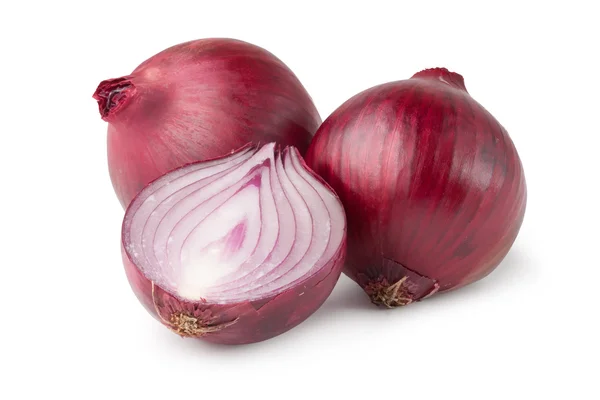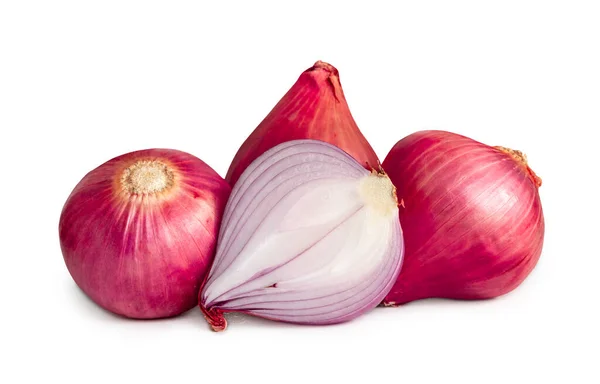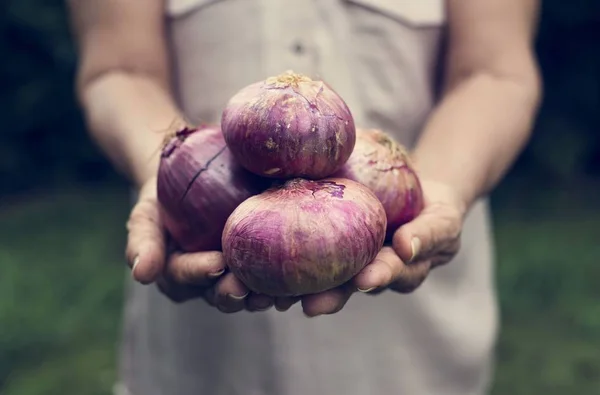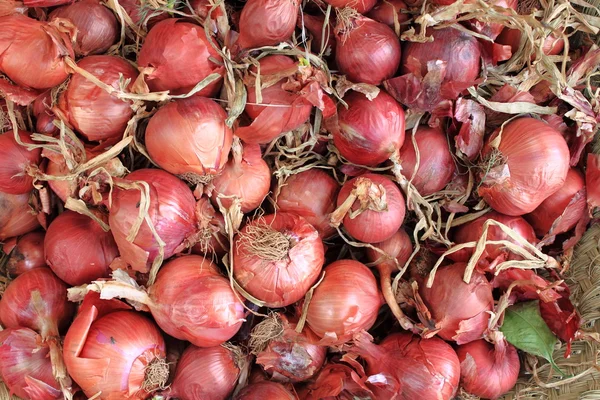The Red Onion Benefits explained in this article will encourage you to eat it regularly. Red onions are a popular ingredient in many cuisines worldwide and with good reason. They are a cultivar of the common onion (Allium cepa), distinguished by its deep red to purple skin and white flesh tinged with red. They are slightly milder and sweeter than other onion varieties, making them popular for salads, salsas, and other raw applications.
Their versatility, flavor profile, and impressive nutritional value make them a valuable addition to any healthy diet. Food enthusiasts and health-conscious individuals alike need to understand the health benefits they offer and how to choose and store them properly.
Red Onion Benefits

1. Cancer Prevention: Red onions, along with other allium vegetables, may offer protection against certain types of cancer, including colorectal, stomach, and breast cancer, thanks to the presence of organosulfur compounds with potent anticancer properties.
2. Heart Health Supporter: Red onions are champions of heart health, boasting the powerful antioxidant quercetin. This wonder compound exerts anti-inflammatory properties, helping lower cholesterol levels and safeguarding against heart disease. Additionally, red onions harbor flavonoids, known to improve blood pressure and circulation, further supporting a healthy cardiovascular system.
3. Blood Sugar Balancing Act: Diabetics and those prone to blood sugar fluctuations can find solace in red onions. Their low glycemic index ensures they won’t cause significant blood sugar spikes, making them a safe and beneficial dietary choice.
4. Immunity Booster: Red onions are brimming with vitamin C, a vital nutrient for robust immunity. Vitamin C fuels the production of white blood cells, our body’s natural defense against infection, keeping us protected from a range of illnesses.
5. Inflammation’s Foe: The anti-inflammatory powerhouses quercetin and other antioxidants in red onions offer significant benefits for individuals suffering from inflammatory conditions like arthritis and inflammatory bowel disease. These compounds work to dampen inflammatory pathways, alleviating pain and discomfort.
6. Gut Health Champion: Prebiotic fibers in red onions act as food for our gut’s good bacteria, fostering a healthy gut microbiome. This translates to improved digestion, better nutrient absorption, and a strengthened immune system.
7. Building Strong Bones: The presence of manganese in red onions makes them a valuable ally for bone health. Manganese plays a crucial role in bone formation and density, helping to prevent osteoporosis and maintain strong, healthy bones.
8. Respiratory Health: Red onions contain quercetin, which has been linked to improved respiratory health. It may help relieve allergy symptoms, reduce inflammation in the airways, and even protect against respiratory infections.
9. Antibacterial Properties: Red onions possess potent antibacterial properties due to the presence of compounds like allicin. These compounds can help fight off harmful bacteria and protect against foodborne illnesses.
10. Eye Health: Red onions are a good source of vitamin A, which is essential for eye health. It aids in vision, particularly in low light conditions, and may help prevent age-related macular degeneration.
11. Detoxification: Red onions can help support the body’s natural detoxification processes. They contain sulfur-containing compounds that aid in removing toxins and heavy metals from the body.
12. Skin Health: Red onions contain vitamin C, which is essential for collagen production. Collagen gives skin its elasticity and helps combat wrinkles and other signs of aging.
13. Weight Management: Red onions are low in calories and high in fiber, making them a filling and satisfying food. They can help you feel full for longer, potentially contributing to weight management efforts.
READ RELATED: Jim Toth Height, Weight, Age, Boyfriend, Family
14. Reduced Risk of Alzheimer’s Disease: Red onions contain quercetin, which has shown promise in reducing the risk of Alzheimer’s disease and other neurodegenerative conditions.
15. Antidepressant Effects: Studies suggest that red onions may have antidepressant effects due to their quercetin content. Quercetin can interact with neurotransmitters in the brain, potentially improving mood and reducing symptoms of depression.
16. Improved Cognitive Function: Red onions may help improve cognitive function and memory due to their vitamin B6 and folate content. These nutrients are essential for brain health and can help prevent cognitive decline.
17. Natural Sleep Aid: Red onions might help you sleep through their prebiotic content, which feeds gut bacteria that produce sleep-promoting chemicals, and their anti-inflammatory properties. While not confirmed, their scent may also be calming for some. which can indirectly improve sleep quality.
ALSO READ: Fresh Leek: Nutrition Facts Health Benefits, and Recipes
Nutritional Value

According to USDA, red onions are a low-calorie food, boasting only 40 calories per 100g serving. They are a good source of:
- Fat: 0.1g
- Carbohydrates: 9.3g
- Fiber: 2.4g
- Sugar: 4.2g
- Protein: 1.1g
- Vitamins
- Minerals
Vitamin C: Provides 14% of the Daily Value (DV), essential for immune function and collagen production.
Vitamin B6: Contributes 10% of the DV, vital for brain health and red blood cell formation.
Potassium: Offers 7% of the DV, crucial for regulating blood pressure and muscle function.
Manganese: Provides 17% of the DV, important for bone health and metabolism.
Folate: Delivers 11% of the DV, essential for healthy cell growth and development.
Red Onion Selection Process

Here’s a guide to choosing the freshest and most flavorful red onions:
Appearance
- Look for firm, heavy onions with a dry, papery skin. Avoid soft, bruised, or moldy onions.
- Choose onions with a smooth, unblemished surface.
- Select onions with vibrant red color. A dull color may indicate age or improper storage.
- Small to medium onions (2-4 inches in diameter) tend to be juicier and have a milder flavor. Larger onions may be drier and have a stronger flavor.
Feel
- Gently squeeze the onion. It should feel firm and resist pressure. Softness indicates overripeness or spoilage.
- Pick up the onion. It should feel heavy for its size. A lightweight onion may be dried out or have lost moisture.
Other factors
- If you plan to store the onions for a longer period, choose onions with thick, tightly closed neck ends. Loose neck ends can indicate dehydration.
- Choose organic red onions if you prefer to avoid pesticides.
- Look for locally grown onions whenever possible. This ensures freshness and supports local farmers.
- Avoid pre-cut or peeled onions, as they lose their flavor and nutrients more quickly.
- If you buy onions in bulk, store them in a cool, dry place with good air circulation.
- Use red onions within a few weeks of purchase for optimal flavor and quality.
ALSO READ: Asparagus Health Benefits, Nutrition Facts and Recipes
Storing Red Onions for Optimal Flavor and Quality

Red onions are a versatile and flavorful addition to many dishes, but improper storage can quickly lead to spoilage and loss of flavor. To ensure your red onions stay fresh and delicious for as long as possible, follow these storage guidelines:
Temperature
- Store red onions in a cool, dry place. Ideally, the temperature should be between 35°F and 40°F (2°C and 4°C).
- Avoid storing red onions near heat sources or in direct sunlight.
- Cool, dark locations like a cellar, pantry, or root cellar are ideal.
Humidity
- Maintain good air circulation around the onions to prevent moisture buildup and mold growth.
- Don’t store them in sealed plastic bags, as this can trap moisture and promote spoilage.
- Open containers like mesh bags, cardboard boxes with holes punched in, or wicker baskets are good options.
Separation
- Store red onions individually and avoid piling them on top of each other. This allows for better air circulation and prevents bruising.
- Separate your red onions from other vegetables and fruits, as some produce ethylene gas, which can accelerate ripening and spoilage.
Expected shelf life
- When stored properly, red onions can last for up to several months.
- However, their peak flavor and quality will be within the first few weeks of purchase.
Signs of spoilage
- Discard red onions that are soft, mushy, or have green or white sprouts.
- Moldy or discolored onions should also be thrown away.
- If you need to store pre-cut red onions, wrap them tightly in plastic wrap or place them in an airtight container and refrigerate them for up to a week.
- You can also freeze red onions for longer storage. Simply blanch them for a few minutes, then freeze them in an airtight container.
Red Onion Key Facts to Note








